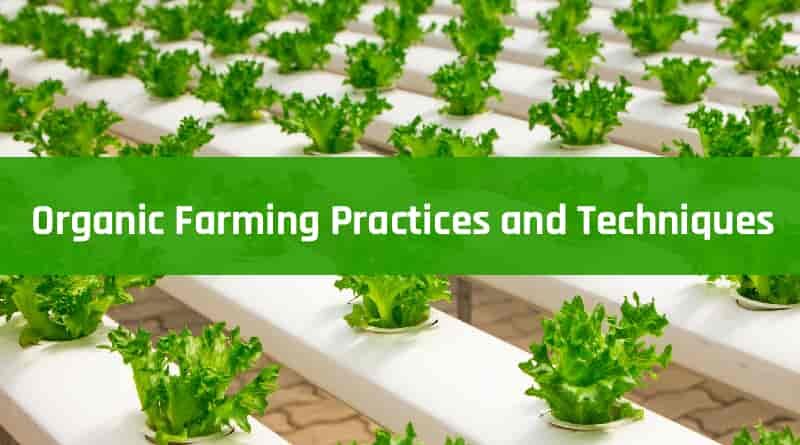Organic Farming Practices and Techniques
Organic farming is the agricultural process of growing robust crops and rearing farm animals without using toxic chemicals such as pesticides, growth boosters, fertilizers, insecticides, and GMOs. Farmers achieve this by nourishing the soil with natural inputs and managing weeds through natural means such as biological controls and cultivation.
Organic agriculture advocates for the production and provision of food that has maximum nutritional value and minimum harm to humans and the environment. They restrict their inputs to only permitted substances. Study shows that as of 2008, an estimated 71,500,000 hectares (approx. 177,000,000 acres) of land worldwide were farmed organically. This is about 1.5% of the total world farmland.
There are certain practices applied by organic farmers to produce food in abundance without relying on synthetic chemical inputs. These practices involve managing the fields and accumulating organic matter and constantly improving the quality of the soil.
In this article, we will learn about weed management, crop rotation, and other organic farming techniques and practices. To find amazing food that comes from farms that practice organic farming, check out our site, Community Natural Foods.
Table of Contents
Farming Practices and Techniques
1. Crop Rotation
This involves cultivating the soil with crops from different families over a stipulated period of time. It is used as one way of improving the resilience of the soil and the farming environment to extremely adverse weather conditions and pests.
Since the crops grown are from different families and have different root structures, crop rotation helps build the soil organic matter fast. The diversity of the crop residues makes the soil very rich in nutrients. Besides, shifting cultivation controls pest and weed infestation because different species of crops are attacked by different pests and weeds. The different root structures also help control soil erosion.
Crop rotation protects the soil nutrients from depletion because the different families of crops boost the release of certain nutrients. In addition, crop rotation may include a fallow period after a certain period of time to give the soil room to accumulate nutrients. This technique, therefore, eliminates the application of synthetic fertilizer that is not allowed in organic farming. At the end of the day, the farmer produces quality food at a relatively lower cost.
2. Application of Animal Manure
Their application is a sustainable soil management practice that is used to enrich the soil with natural components from animals. These components can either be raw or composted. It can be a superb soil conditioner and a source of nutrients for the crops.
When properly applied, it improves the soil’s water retention capacity, the soil quality and it can recycle essential nutrients to crops.
For this practice to be more effective, it is often used in conjunction with other practices such as crop rotation, cover cropping, and liming.
When applying animal manures in organic farming, it is important to ensure the product has no synthetic additives. The soil must also be tested before the application to ensure they are compatible. It must also not be applied just before harvesting— allow at least 3 months before harvesting.
The most preferable animal manures are the composted components, but this excludes slaughter by-products. Composted forms have a compact nature and usually have few contaminants.
3. Application of Green Manure
This is the use of green undecomposed plants to fertilize the soil. It can either be obtained by growing green crops that are eventually harvested for this use by collecting green leaves- together with a few twigs- from plants that have naturally grown on their own.
Most of the plants used to produce green manures are from the leguminous family. After they have grown to a reasonable size, they are incorporated into the soil to provide nutrients. Common crops for this use include dhaincha, sunn hemp, and cluster beans.
They enrich the soil with a number of nutrients, the most notable one being nitrogen. It also increases the level of moisture in the soil. Green manure provides nutrients for soil microorganisms, improving aeration, and the general quality of the soil.
4. Cover Cropping
Cover crops are crops planted with the primary aim of improving the farming system. They are usually planted between the rotations of crops that are used to produce income for organic farmers. In some cases, they are planted together with these crops.
Cover cropping can tremendously improve the biological, physical, and chemical properties of the soil. Cover crops also help in weed control by preventing sunlight from reaching the unwanted plants. They can supply the soil with nitrogen, control the leaching of nutrients, and reduce soil erosion.
5. Integrated Pest Management
Organic agriculture does not aim at completely destroying the pests because one of its main aims is to promote the sustainable use of the environment. Organic farmers have to maintain the biodiversity of the ecosystem.
Integrated pest control uses alternative pest control methods— biological pest control (using predators such as aphids), prevention, physical removal, the construction of natural barriers, etc.
Integrated pest management allows the use of synthetic substances, only to a certain level. Only the use of mild pesticides approved for organic farming systems is allowed. These synthetic additives such as sulfur, baking soda, neem (a natural pest repellent), and hydrogen peroxide should have very minimal adverse effects to humans and the environment.
6. Integrated Weed Management
Just as is the case with pest management, the heavy application of chemicals is not allowed in the management of weeds in an organic farming system. Organic farmers have to apply alternative weed management methods.
An integrated weed control technique calls for the combined application of methods such as grazing, land fallowing, and biological control.
Grazing involves allowing herbivorous animals to feed in the weeds and control their growth or eradicate them completely. Land fallowing on the other hand gives room for the growth of perennial pastures that consequently out-compete weeds.
7. Sustainable Livestock Farming
Involves the creation of a livestock production system that ensures there is food security while also preserving the environment for future generations (sustainability).
This is achieved by excluding synthetic additives such as growth boosters, synthetic medication, GMOs, and antibiotics.
The farming system entails providing proper natural conditions for the growth of cattle and poultry.
In Conclusion
Organic farming aims at achieving two major things— food security and environmental sustainability. Chemicals often used in farming systems and synthetic additives often introduce a dynamic that causes harm to humans and nature. Organic practices and techniques only use natural means and products to boost productivity and eradicate any form of synthetic additives such as fertilizer unless it is allowable in organic farming.




